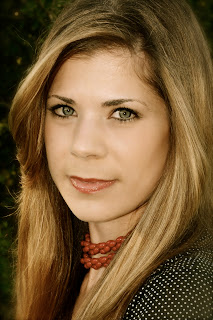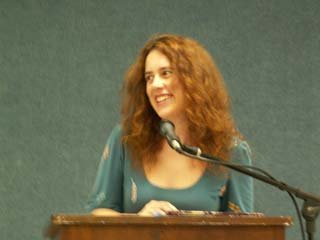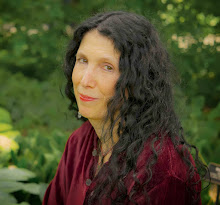I love Sarah McCoy. Her novels and the person. We met on twitter and discovered that we share so many things--packing phobias, curly hair products, and a love and obsession with our writing. I loved The Time it Snowed in Puerto Rico, and I love The Baker's Daughter even more. I'm not just honored to have Sarah here on the blog--I'm deliriously happy because she's also my friend. Thanks for everything, Sarah!
Where did the idea for this novel spark?
On my first visit to El Paso to look for a place to live, my husband and I were on the plane with a group of Germans. I didn’t think it too out of the ordinary at the time. I figured it was a tour group – vacationing Europeans off to see the American Wild West. My dad was an Army officer, and we were stationed in Germany during my childhood. My husband also grew up in Germany, speaks fluent German, and worked at a German resort during college. So we were familiar with the German fascination with America’s cowboys and Indians as much as our own with their lederhosen and beer steins.
Months later, when we officially moved to El Paso, the city magazine asked me to write a feature article on the German community. I had no idea there was an established community. I learned: the Luftwaffe has trained fliers in the United States since 1958. In 1992, they consolidated their troops at Holloman Air Force Base, New Mexico, just up the road from El Paso. Yes, there is a sizeable German air force base on the Tex-Mex border. Bet you didn’t know that! I sure didn’t but was instantly riveted.
My research for the magazine led me to a bakery in town called Marina’s German Bakery. The staff graciously allowed me to poke around their kitchen and ask a bazillion questions, which ultimately led to the creation of Reba and the present-day storyline of The Baker’s Daughter.
Then one day, my husband and I went to a farmer’s market and met an octogenarian German woman selling bread. I was completely enamored of her, and all that I imagined her life might’ve contained. While picking out my brötchen rolls, I asked how she came to be in El Paso. “I married an American solider after the war,” she said, and I had a vision of a young woman named Elsie in 1945 Germany. My childhood in Germany, and my many visits back as an adult, stoked my imagination as I dug into the history books and firsthand accounts of that horrifying final year of World War II.
What about your present-day research for Reba’s story?
For that, all I needed to do was open my eyes and look around; unplug my ears and listen to my neighbors; allow myself to challenge the prevalent immigration opinions and imagine it from a Mexican national’s perspective or from an American who loved and cared about that person. I read Border Protection and police raid transcripts, cut out articles from the newspaper, listened to radio and TV reports, and read the essays my students wrote. I was teaching writing courses at the University of Texas at El Paso. Then I went out to where El Paso’s Interstate-10 curves around the heart of Ciudad Juarez. On one side of the highway, a giant Mexican flag flies over desert shacks burning tires for warmth. On the other side, UTEP’s giant Sun Bowl with digital screens and football fans eating heaps of nachos each weekend. It’s a stark contrast. All-American versus… not.
Your second novel is vastly different from your first— a coming-of-age story. Is that something you consciously aimed for or does your imagination take the helm?
In my writing and reading, I love stories in which I learn something new—be it historical, emotional, philosophical, scientific, artistic, etc. I like to close a book and know that I’ve acquired some body of knowledge that I didn’t have prior to opening the cover. I can’t write the same thing twice just as I couldn’t learn to ride a bike twice. Once you learn, it sticks. So you move on to how to waterski or do the Cha Cha, paint a landscape or make a lemon battery—something new.
The Time It Snowed In Puerto Rico is about an 11-year-old Puerto Rican girl coming of age in the 1960s. The Baker’s Daughter is about war and exclusion, love and forgiveness. The appeal for me, as the author, is in the discovery of unexplored themes and learning from the characters as they share their stories.
The hat on your book cover is red and you use the color throughout the story. Was that intentional?
(I’m in good red-loving company, Caroline. I blatantly covet your red boots and am on a quest to find a pair by the time we meet in person.)
The use of the color red was not intentional. It simply started appearing in the story: a poppy, a sunset, a dress, a ribbon, geraniums, a hat. It organically bloomed from the characters. About three quarters of the way into writing, I stopped and took notice.
In regards to the cover, I had no clue what the designer would come up with, but when I saw the woman’s back and the red hat, it all seemed to fit. There’s something about red. It grabs your attention and holds it. It’s beautiful, vibrant, and slightly alarming. In a color, it captures how I felt while writing this novel—how the characters felt in each of their settings.
What's obsessing you now?
Motherhood. I’m at that age when every friend I know seems to be nursing a newborn or pregnant. I’ve sat besides friends waiting for stripes on the pregnancy wand and friends undergoing months of fertility treatment to both joyful and disappointing outcomes. The concept of nurturing—the definition of being a nurturer– keeps me up at night. What lengths will we go through to fulfill our desire to parent? And what happens when the traditional path fails or is not chosen? Can you still be one? Of course, all of this has funneled into my current work-in-progress, novel #3.
What question didn't I ask that I should have?
I guess you could’ve asked me who is the baker’s daughter? But I’m glad you didn’t because I can’t say for absolute certain. There are so many layers of daughters in this book. What I can say is that I am not the baker’s daughter! My mom can fry a fierce egg and steam up seafood like you’ve died and gone to Old Bay heaven, but growing up, she wasn’t much of a flour-&-yeast devotee. For a few years, she tried her hand at homemade sourdough in a bread machine. My brothers and I thought the vertical loaves extremely odd and the frothy “culture” worthy of a horror movie. We went to the supermarket bakery for baguettes instead. She gave up and stuck to baking peanut butter cookies after that.

























